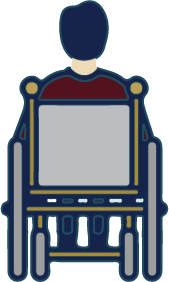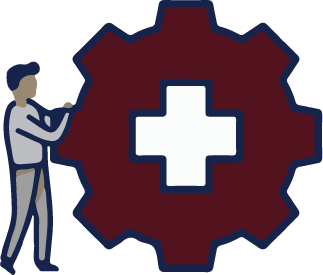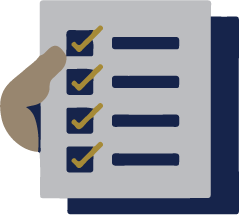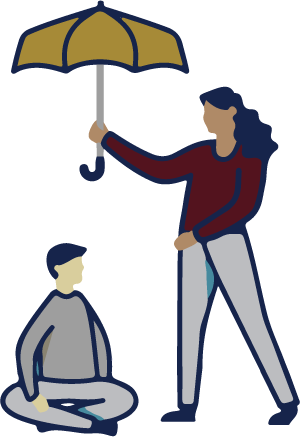Special Monthly Compensation (SMC)
What is Special Monthly Compensation?

SMC may assist disabled veterans afford things like:
- A vehicle that will transport a wheelchair, walker, etc.,
- Someone helps care for the veteran,
- Electronics to help with communicating,
- Items like ramps or lifts to help get in and out of the house.
What is considered loss or loss of use?
Amputated body parts or body parts with no effective remaining function of a limb or organ are considered as a loss or loss of use. The VA considers these disabilities for Special Monthly Compensation.
What disabilities qualify for Special Monthly Compensation?
Disabilities the VA may consider for SMC include:
- Loss or the loss of use of a hand or a foot,
- Unable to move a joint or paralysis of one or more limbs,
- Cannot see in at least one eye (having only light perception),
- Loss of use of reproductive organ(s),

- Complete loss or loss of use of both buttocks,
- Loss of hearing in both ears (absence of air and bone conduction),
- Unable to talk (complete organic aphonia), or
- Loss of tissue from a single breast or both breasts from a mastectomy or from radiation treatment.
What if I have a combination of these disabilities?
- Loss or loss of use of the feet, legs, hands, and arms, based on the combination of disabilities,
- Severe deafness combined with bilateral blindness,
- Paraplegia with complete loss of bowel or bladder control,
- A service-connected disability at the 100% rate that causes the veteran to be housebound, bedridden or in need of help for the normal activities of daily living, or in need of daily health care services, or
- Other service-connected disabilities combined with those listed above.
How do I apply for Special Monthly Compensation?
Applying for SMC requires specific documentation to be submitted that shows that a disability happened while on active duty and additional information showing the severity of the disability.
This may include medical records, x-ray studies, physician reports, labs, and physical therapy reports. You may also need to provide a copy of your marriage certificate and the birth certificates for each of your children. A copy of your DD-214 is required.
SMC paperwork is filed at a local VA office. To get help with a disability application and with putting together the documentation for the claim contact the nearest VA office. To find a local VA office,
The VA recommends working with an accredited representative. To locate and appoint an accredited representative, visit the representative will assist with preparing and submitting claims for VA benefits.
Instructions to file an SMC claim can be
Which veterans are eligible for Special Monthly Compensation?
- The veteran must have served on active duty, active duty for training, or inactive duty training,
- The veteran has been injured or became ill during military service, or had an illness or injury before service that was significantly aggravated by service, and
- The veteran has a disability related to active-duty service.

How long does it take the VA to decide about Special Monthly Compensation?
How do I know how much I may get from SMC?

How is Special Monthly Compensation calculated for a Veteran?

- The amputation of one or more limbs, hands, or feet,
- The loss of use of one or more limbs, hands, or feet (meaning you have no effective function remaining),
- The physical loss of one or both eyes,
- The loss of sight or total blindness in one or both eyes,
- Being permanently bedridden (unable to get out of bed),
- Needs daily help with basic needs (like eating, dressing, and bathing), also called “Aid and Attendance,” and
- The veteran has dependents like a spouse and children.
Can the VA pay Special Monthly Compensation if I need the assistance of another person?

VA Aid and Attendance eligibility
- They need another person to help them perform daily activities, like bathing, feeding, and dressing; or
- They must stay in bed or spend most of the day in bed because of illness, or
- They are a patient in a nursing home due to the loss of mental or physical abilities because of a disability, or
- Their sight is limited (even with glasses or contact lenses they have only 5/200 or less in both eyes; or concentric contraction of the visual field to 5 degrees or less).
Housebound benefits eligibility
To be eligible, a veteran must be receiving a VA pension and spend more of their time in their home due to a permanent disability.
NOTE: Veterans are eligible for only one of these two benefits. They cannot be used at the same time.
How do I apply for Aid and Attendance or Housebound benefits?
To apply for either benefit, a completed VA form should be sent to the pension management center (PMC). VA form 21-2680 should be completed and mailed to the PMC of the veteran's state. A doctor will need to fill out the examination information section.
Other evidence that may be included with the veteran's application form:
- A doctor’s report, that shows the need for Aid and Attendance or Housebound care, or
- Details about what the veteran normally does during the day and how they get to places, or
- Details that help show what kind of illness, injury, or mental or physical disability affects the veteran’s ability to do things, like take a bath, on their own.

Read more on the as support for a claim.
Veterans that are in a nursing home, they may fill out a Request for Nursing Home Information in Connection with Claim for Aid and Attendance (VA Form 21-0779).
Otherwise, veterans may apply in person at the
